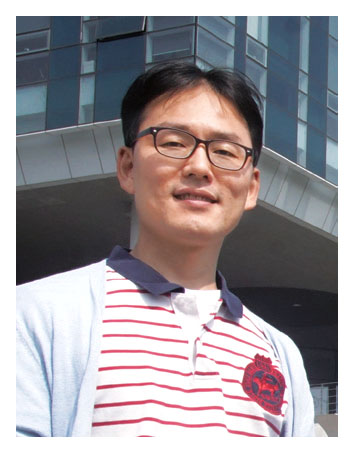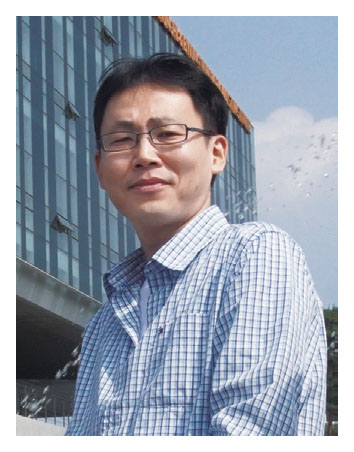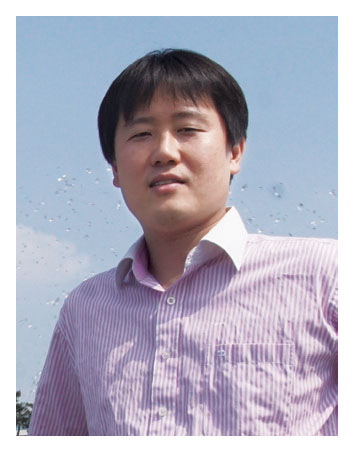When thinking about working at research laboratories, people unfamiliar with how those labs operate usually conjure up an image of labs full of researchers. The idea of technical staff working there rarely crosses their minds. Despite their importance in research lab operation, technical staff have never been in the public spotlight. KIM Sae-Ho from the Center for Synaptic Brain Dysfunctions, RAH Won-Tae from the Center for Relativistic Laser Science, and SHIN Jae-Won from the Center for Nanomaterials and Chemical Reactions are senior technical staff, or engineers, at 1BS Centers. They shed light on working as technical staff by sharing their experiences.
"We provide necessary assistance so that researchers can concentrate on research. Our roles may differ at different Centers."
When asked about their roles, Shin says they are not standardized. Just as different companies have different assistance units, engineers provide necessary assistance depending on Centers' needs. It is hard to put their diverse roles into one category. Kim notes that one role is closer to an administrator: "Many engineers have non-research experience. Administration is an important part of our job requiring work process management and negotiation. If engineers only have research experience, they often face difficulties in the wide range of responsibilities."

▲ KIM Sae Ho (Center for Synaptic Brain Dysfunctions)
Partners and Companions to Researchers
Becoming a researcher seems the most likely career path to many thinking of working at a research institute. Aspiring researchers go to graduate school, choose an area for their Ph.D., and set research directions as post-docs. Finally, they commit to research at a school or lab. It was the path chosen by researchers only a decade ago. According to Rah, the launch of IBS has changed the landscape of research environments - e.g. , introduction of large-scale equipment - and changed the roles, status and background of technical staff: "I heard that there was a subtle sense of hierarchy between technical staff and researchers in the past. A clear line was drawn to differentiate researchers, admin and technical staff. Now things have changed. Most technical staff have earned a Ph.D. in the field of their labs and chosen to provide research assistance rather than conducting research. As far as I know, most IBS engineers made the same choice as me.
"Previously, technical staff were strictly separated from researchers. While researchers were considered highly-skilled specialists performing the main function of a lab - research, technical staff were considered mere assistants, less specialized. But now they are also considered uniquely specialized to perform another important function at the lab. Kim says in-depth understanding of the lab's field is essential to serve as "communication channels" between researchers inside and non-researchers outside: "We are involved in almost everything occurring in the lab, but our most critical role is to ''bridge" the lab with outside. Though "assisting'' research is our main job, understanding science behind research is critical to make communication happen with outside. I was a researcher at a lab of a private company before joining IBS and it is a big help for my work now."
If they describe their work in one word, it is "lab management." While their main duty in the past was managing equipment, technical staff now manage everything necessary for lab operation. Kim says technical staff become more specialized and their status is not what it was in the past: "IBS engineers and researchers seem to think of each other as colleagues with different specialties. This may be due to positive dynamics as a young institute partly, but also due to raised awareness on the importance of lab management."
They all worked as researchers before: Kim at the Biomedicine Research Center of Samyang Biopharm; Rah at LG Electronics; and Shin at the Korea Basic Science Institute.

▲ RAH Won Tae (Center for Relativistic Laser Science)
Hidden Hero and Lab Organizer
Lab management is never easy. All research related matters, from administration to PR to legal issues, virtually everything that may affect research activities is within the scope of responsibilities. They need to care about more things than when they were researchers; many of the jobs cannot be easily understood by researchers. Purchasing equipment is one of them, a seemingly simple job for researchers but a major difficulty for technical staff: "It is frustrating when we cannot provide equipment at the right time. Budgets are limited and purchasing entails complicated procedures hindering timely equipment acquisition. Sometimes, we cannot properly reflect researchers' needs in purchasing decisions. For example, when we need a machine for DNA analysis, some researchers prefer a certain manufacturer while others prefer another. In the end, due to budget limits, we can choose one. I am a researcher-turned engineer and I know different brands may produce different data. It's hard to ignore their different requests."
Unclear job boundaries are another difficulty according to Rah. Lab management is not project-based like research and has many minor details that need attention. The workload is unpredictable; it is extremely heavy during audits, equipment inspections or other occasions that require heavy administrative work: ''.Just like everywhere else, assisting roles require attention to many minor details. Each may look simple but there are so many."
Upon the launch of a new lab, technical staff get even busier. They decide the lay-out of furniture and deal with contractual matters related to lease or purchases. Planning lab interior, managing contractors and suppliers, scheduling the use of equipment, and amending lab regulations are all on their to-do lists. Kim says the first two years after his Center's launch was a never ending series of tasks: "Things were toughest at the Center's beginning. Designing a lab, acquiring equipment and legal issues were all new to me. I had nowhere to turn for advice, so had to solve everything by myself. Now with my own system, things are easier. There's still some unpredictability, but not as serious as before."
Work boundaries at IBS are less clear than at other government-funded institutes, says Shin. While admin staff handle legal issues, purchases, or PR at those institutes, they are engineers' jobs at IBS. One reason is Campus Centers' succession of graduate school systems of colleges, their host institutions: "Including the Center for Nanomaterials and Chemical Reactions, school labs are converted into IBS Centers while maintaining the same workforce and organizational structure. It is convenient for researchers, but the systems are like apprenticeship, involving hierarchical relationships between students. It makes it hard to set clear work boundaries."

▲ SHIN Jae won (Center for Nanomaterials and Chemical Reactions)
New Stimulations, Broad Work Spectrum
It was hard to form a coherent picture of technical staff work of based on their descriptions. Centers have different needs and work duties of engineers are never the same. Compared with being a researcher, which sets a clearer scope of responsibilities and goals, being technical staff sounds somewhat draining. However, they are satisfied with their current job.
"Of course, there are some downsides. Taking credit for my work is not easy and many chores exhaust me sometimes. But the knowledge that I am continuously pushing my boundaries and developing myself, overweigh downsides. I am not extraordinarily diligent and if I had remained in research I might not have made progress I'm making now. This job is broadening my perspective on research and lab management," says Shin.
"That broad perspective is what technical staff need," Rah adds. They should be equipped with T-shaped skills; having advanced expertise in a single field and ability to apply that to other areas and collaborate across different areas. Kim says some weaknesses can be overcome with more experience and know-how. Kim strongly argues that the job of technical staff should be treated as a specialized profession: "Specialists that comprehensively manage a lab are commonly found in other countries. They help increase research efficiency by removing administrative distractions so researchers can concentrate on research. If technical staff have research experience, they can also offer ideas or advice. This is why we need specialized lab managers." All three agree that the "broad spectrum" of responsibilities is a fascinating part of their job. They can smooth out lab operation by providing help in administration, management and research.
"When I decided to make a career shift from a researcher to IBS engineer, my professor told me to remember that I might have to return to research. Now I can further develop research expertise and go back to a research position if I want," says Shin.
Kim and Rah share the same experience and prospects for the job. There are many learning opportunities and if there is something they want to study, they will be given a change to go back to research. One downside is that they have few opportunities to interact with other technical staff.
"We would like to meet with IBS engineers to share our ideas. Our work duties may differ by Center but we still have many things we can share," says Rah. Interactions and discussions are as important for technical staff as for researchers. Responding to situations at labs and assistance needs of researchers is a problem-solving process resembling a research process. The stories of three senior engineers, though they may be just a glimpse of technical staff, explain how IBS Centers have produced such great achievements despite its short 5-year history. IBS may be the starting point of a change for which our three engineers hope: someday all technical staff will be acknowledged as essential for lab operation.


 thumb.jpg
thumb.jpg














